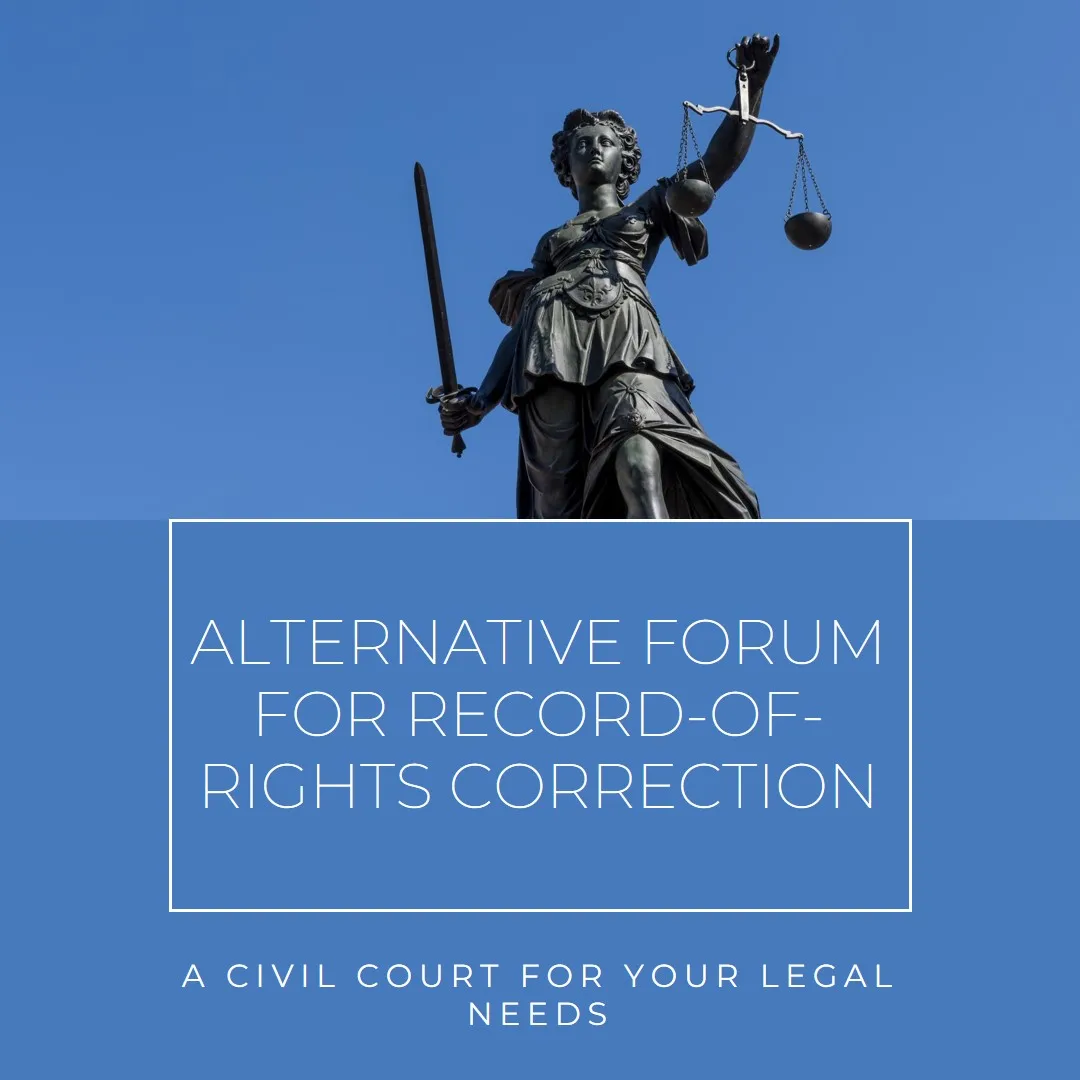
Related Questions:
Alternative Forum (Civil Court) for Correction of Record-of-Rights.
Civil Court/Writ in the High Court Division.
কখন ১৪৪ এর আন্ডারে এবং কখন Alternative Forum.
Civil Court এর Section 42 of SR Act এর আন্ডারে মামলা করতে হবে?
Determining the Appropriate Forum: Section 42 of SR Act
- Land Survey Tribunal Jurisdiction: Corrects administrative errors in record of rights (under section 144).
- Disputes over Title or Ownership: Civil courts have jurisdiction to resolve disputes over legal ownership or title to property.
- Legal Principle (“coram no judice”): If the Land Survey Tribunal cannot decide on ownership disputes, it lacks jurisdiction.
- Civil Court Authority: Empowered to determine legal ownership and title through judicial process.
- Case Law: Govt. of Bangladesh v AKM Abdul Hye & others clarifies:
- No need to challenge record of rights within 6 years for ownership disputes.
- Must file civil case within 6 years for court declaration of legal ownership.
- Timely Filing: File case within 6 years of incorrect record publication if it causes legal problems or loss.
Summary of Forum Selection
- Dispute Type: Actual title disputes should be filed in civil court.
- Time Limit: 6 years from incorrect record publication to file civil case.
- Land Survey Tribunal Role: Limited to correcting administrative errors in records.
Visual Summary
Land Survey Tribunal: Corrects administrative errors.
Civil Court: Resolves ownership disputes.
Time Limit: 6 years from incorrect record publication.
Conclusion
Understanding the distinction between Land Survey Tribunal and civil court jurisdictions is crucial for addressing disputes over land ownership effectively. Civil courts provide the forum for resolving title disputes, ensuring legal clarity and justice.
It seems like you’re describing the process and legal provisions related to seeking declaratory relief and using writ jurisdiction in land disputes. Here’s a visually organized and enhanced version of your text:
Declaratory Decree and Writ Jurisdiction in Land Disputes
Section 42 of the Specific Relief Act, 1877
- Purpose: Allows individuals to seek a declaratory decree from the court regarding their legal right or claim to property or character.
- Nature of Relief:
- Court may grant a declaration affirming the plaintiff’s entitlement.
- Consequential Relief: Includes orders to cancel or correct records if necessary.
- No Compulsory Additional Relief: Plaintiff isn’t required to seek any further relief beyond the declaration of their title.
- Limitations:
- If additional remedies are available to the plaintiff but not pursued, the court cannot grant the declaration.
Process and Implementation
- Filing a Declaratory Suit1: In civil court, aimed at correcting disputed records-of-right (property ownership documents).
- Decree Issuance: Court issues a formal decree to rectify record errors based on its decision.
- Implementation: Plaintiff presents the decree to the settlement office under the State Acquisition and Tenancy Act, 1950, for corrections.
Conditions for Application
- When to Use:
- Before establishment of the Land Survey Tribunal.
- Dispute over property ownership after final publication of the revised record-of-rights.
- Alternative Forum: High Court Division can be approached:
- Expired Time Limit: If time limit for Land Survey Tribunal approach has passed.
- Justifiable Delay: Valid reasons for delay.
- No Equivalent Remedy: No equally effective alternative remedy available.
- Writ Jurisdiction: High Court Division’s power under writ jurisdiction (e.g., Co-warranto writ under section 102) to issue orders resolving disputes.
This structure aims to visually enhance the clarity and accessibility of the legal processes and options available in land disputes, utilizing bullet points and headers for easier comprehension.
In the scenario involving Mr. Smith and Mr. Johnson’s land dispute, here’s a clear and visually enhanced presentation of the legal options and timelines:
Resolving a Land Ownership Dispute: Mr. Smith vs. Mr. Johnson (Imaginary Case)
Disagreement Over Land Ownership
- Parties Involved: Mr. Smith and Mr. Johnson are disputing ownership of a piece of land.
- Legal Forum Options:
- Land Survey Tribunal: Deals with property disputes, but may lack authority to decide ownership.
- Civil Court: Has jurisdiction over ownership disputes and can issue rulings on legal title.
Challenging Incorrect Record of Rights
- Issue: Official records (record of rights) incorrectly list Mr. Johnson as owner, contrary to Mr. Smith’s claim.
- Legal Precedent: As per Govt. of Bangladesh v AKM Abdul Hye & others:
- Time Limit: Mr. Smith has up to six years from:
- The date Mr. Johnson denies his claim based on incorrect records.
- The date of publication of incorrect records, if they are the basis of Mr. Smith’s legal action.
Filing Lawsuit
- Objective: Assert Mr. Smith’s rightful ownership of the land.
- Deadline: Lawsuit must be filed within six years of the triggering event (denial of claim or publication of incorrect records).
- Procedure: Mr. Smith should file a lawsuit in a civil court to rectify the record of rights and establish his ownership.
Important Considerations
- Jurisdiction: Civil court has authority to resolve disputes over land ownership.
- Timing: Adherence to the six-year deadline is crucial for legal action regarding incorrect records.
This structured format provides clarity on the legal steps Mr. Smith should take to challenge the incorrect records of ownership effectively within the specified timeframe.
- Someone can ask the civil court to declare that the disputed record of rights shows their ownership instead of someone else’s. They can also ask for an order to correct errors in the record. ↩︎






